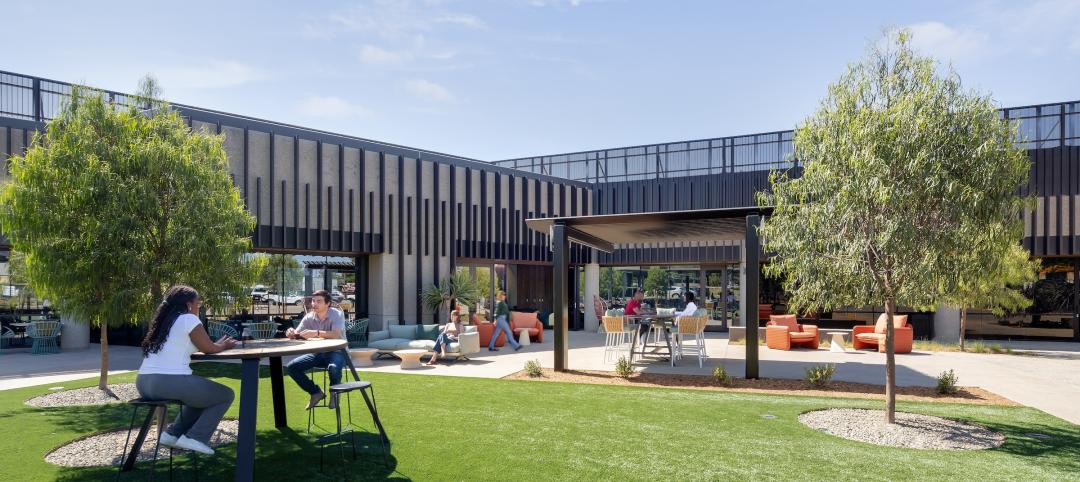International design and architecture firm Perkins Eastman and California-based firm Dougherty are pleased to announce the intent to merge their practices. The merger will significantly build upon the established practices—particularly K12 and higher education design—of both firms and diversify their combined expertise, particularly in California. The combined firm will total over 1000 employees, adding enhanced resources, client value, and opportunities for employees. The merger is planned to be effective May 1, 2018.
Erich Burkhart FAIA, Executive Director and Managing Principal of Perkins Eastman’s San Francisco office, says, “Perkins Eastman has had a longstanding commitment to expand on the West Coast. Dougherty’s respected and highly-regarded architectural design practice here in California naturally aligns with Perkins Eastman’s plan to diversify the firm’s expertise in the region, enhancing our client relationships, and providing growth opportunities for our valued employees.”
Betsey Olenick Dougherty FAIA, LEED AP, Dougherty’s founding principal, furthers: “The merger of Dougherty with Perkins Eastman represents the perfect alliance of a highly respected international design firm with a regional hands-on studio. Both firms share a common cultural commitment to personal service, quality, technology advancement, sustainability, and community-based quality of life projects.”
Both firms were founded with similar beliefs—that architecture can have a direct and positive impact on people’s lives, achieved through close collaboration with the client and community. In particular, the award-winning K-12 and higher education portfolios of both firms reflect a commitment to the planning and design of high-performance environments that enhance educational outcomes for students and function as the centers of their communities. The merger will strategically position the combined firm to better address the requirements—and opportunities—of 21st-century high-performance educational and other civic environments.
Related Stories
MFPRO+ New Projects | Oct 30, 2024
BIG’s One High Line finally reaches completion in New York City’s West Chelsea neighborhood
One High Line, a luxury residential project spanning a full city block in New York’s West Chelsea neighborhood, reached completion this summer following years of delays related to investor lawsuits.
Urban Planning | Oct 30, 2024
Bridging the gap: How early architect involvement can revolutionize a city’s capital improvement plans
Capital Improvement Plans (CIPs) typically span three to five years and outline future city projects and their costs. While they set the stage, the design and construction of these projects often extend beyond the CIP window, leading to a disconnect between the initial budget and evolving project scope. This can result in financial shortfalls, forcing cities to cut back on critical project features.
MFPRO+ New Projects | Oct 30, 2024
Luxury waterfront tower in Brooklyn features East River and Manhattan skyline views
Leasing recently began for The Dupont, a 41-story luxury rental property along the Brooklyn, N.Y., waterfront. Located within the 22-acre Greenpoint Landing, where it overlooks the newly constructed Newtown Barge Park, the high-rise features East River and Manhattan skyline views along with 20,000 sf of indoor and outdoor communal space.
Libraries | Oct 30, 2024
Reasons to reinvent the Midcentury academic library
DLR Group's Interior Design Leader Gretchen Holy, Assoc. IIDA, shares the idea that a designer's responsibility to embrace a library’s history, respect its past, and create an environment that will serve student populations for the next 100 years.
Resiliency | Oct 29, 2024
Climate change degrades buildings slowly but steadily
While natural disasters such as hurricanes and wildfires can destroy buildings in minutes, other factors exacerbated by climate change degrade buildings more slowly but still cause costly damage.
Office Buildings | Oct 29, 2024
Editorial call for Office Building project case studies
BD+C editors are looking to feature a roundup of office building projects for 2024, including office-to-residential conversions. Deadline for submission: December 6, 2024.
Healthcare Facilities | Oct 28, 2024
New surgical tower is largest addition to UNC Health campus in Chapel Hill
Construction on UNC Health’s North Carolina Surgical Hospital, the largest addition to the Chapel Hill campus since it was built in 1952, was recently completed. The seven-story, 375,000-sf structure houses 26 operating rooms, four of which are hybrid size to accommodate additional equipment and technology for newly developed procedures.
Multifamily Housing | Oct 28, 2024
A case for mid-rise: How multifamily housing can reshape our cities
Often referred to as “five-over-ones,” the mid-rise apartment type is typically comprised of five stories of apartments on top of a concrete “podium” of ground-floor retail. The main criticism of the “five-over-one” is that they are often too predictable.
Sports and Recreational Facilities | Oct 24, 2024
Stadium renovation plans unveiled for Boston’s National Women’s Soccer League
A city-owned 75-year-old stadium in Boston’s historic Franklin Park will be renovated for a new National Women’s Soccer League team. The park, designed by Fredrick Law Olmsted in the 1880s, is the home of White Stadium, which was built in 1949 and has since fallen into disrepair.
Laboratories | Oct 23, 2024
From sterile to stimulating: The rise of community-centric life sciences campuses
To distinguish their life sciences campuses, developers are partnering with architectural and design firms to reimagine life sciences facilities as vibrant, welcoming destinations. By emphasizing four key elements—wellness, collaboration, biophilic design, and community integration—they are setting their properties apart.

















